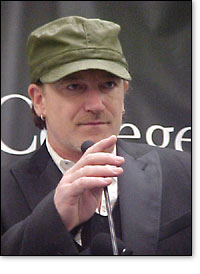 Dr. Morton Middlefart
Dr. Morton Middlefart, Rushmore University graduate

I have to choose my words carefully since I would prefer not to be sued by Rushmore University. If you've never visited the campus of Rushmore, that's understandable. There is none. Rushmore, you see, is a totally online, totally unaccredited "university." Some people call businesses like Rushmore diploma mills, but I wouldn't do that.
Rushmore is certainly different from the more widely known, accredited online universities, such as the University of Phoenix. You can enroll in Rushmore's MBA (Master of Business Administration) program for a one-time payment of $5,499. No Bachelor's degree, the normal prerequisite for an MBA? No problem, because Rushmore doesn't require a Bachelor's degree. Don't waste your time studying for the usual admissions test either. There is none. Speed is of the essence at Rushmore, though. Because there are no admissions tests and no transcripts required, your application will be processed in a mere three days.
Rushmore also offers a Ph.D. Don't forget to send $9,899 payable to Rushmore if you're applying for the doctoral program. I'm not quite sure why the doctorate costs almost twice as much as the MBA, but completion of a doctorate allows one to claim the title of Dr.
One of the advantages of being a student at Rushmore is that there are no tests to take. From what I can tell from the school's
website the curriculum consists of reading a series of books, most of which I read when I was 13 or 14 years old, and writing a short book report on each. Dale Carnegie's
How to Win Friends and Influence People is one example of a book that some Rushmore students have read in fulfillment of a course requirement. It looks like a Rushmore student can earn a doctorate by reading and reviewing 10 or so books of this sort, and then writing a thesis. Dr. Middlefart's thesis has been turned into a
published book, which Rushmore encourages.
If only Rushmore had been around when I was a teen. I could have sent my check, written my book reviews and a thesis, and subsequently strutted around with the title Dr. in front of my name. To be honest, being on the football team would have been more prestigious than calling myself "Dr.," so I guess it doesn't matter that my doctorate came years later, after reading a lot of technical books that make the Dale Carnegie classic look like kindergarten stuff.
The question Rushmore graduates must ask, and I would've asked even as a teen, is whether the degree is worth the tuition. You see, universities, the accredited kind, try to make sure that their graduates are able to perform on the job once they graduate. They do this by imparting some degree of rigor to the curriculum, requiring admissions tests, and assessing students' progress (by testing them). Rushmore, in my opinion, is lacking all of these characteristics. That's not to say that it's a diploma mill. Diploma mills require no work of their students. Rushmore does. It's just not very rigorous work that Rushmore requires.
There is a free rider issue in accredited universities, however, that sometimes weakens rigor, leads to a watering down of courses, and results in grade inflation. The downhill slide starts when student "consumers" raise a ruckus because standards are too high, at least in their opinions. In other words, students love an easy A. Ok, that's human nature--the something for nothing mentality. But if all students receive easy As, then the reputation of the university giving those easy As is going to hit the skids pretty fast.
A university whose graduates are found lacking by employers will find that employers won't hire more of those graduates. Then, the chickens come home to roost, as my grandmother used to say. The degree becomes worthless in the marketplace. A university that passes everybody on with high grades confers a degree that's devalued in the market place. The degree depreciates quicker than a '83 Yugo sold by Honest John's Used Auto Sales.
Thus, individually, students would like an easy course, easy grade, and easy degree. But collectively, it's in their interests to maintain rigor. In the case of unaccredited "universities" like Rushmore, the all-too-apparent lack of rigor is going to mean that most of its graduates will never teach at an accredited college or be viewed in the same light as someone with a degree from an accredited institution. Still, the degree may not be totally worthless. A diploma hanging on a wall is worth something as a status symbol. So is the right to call yourself Dr.
From what I've seen on his web site, Rushmore graduate Dr. Morton Middlefart is a cool guy from Denmark with a less than cool name. Like Dr. Middlefart, Rushmore graduates seem to be all male and already in the business world. If Rushmore can give them a boost in their careers, then who am I to criticize? I'm just not sure how much of a boost they're going to receive. Ultimately, unaccredited universities like Rushmore will have to pass the market test and demonstrate to prospective students that they're worth the cost of their tuition. That's the way of the free market.
Link

















